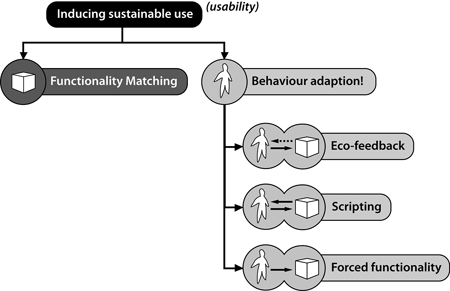
TU Delft’s Renee Wever and Jasper van Kuijk (who runs the insightful Uselog product usability blog), together with NTNU’s Casper Boks, have produced a very interesting paper, ‘User-Centred Design for Sustainable Behaviour’ [PDF, 400 kb] for the International Journal of Sustainable Engineering (indeed, probably in the same edition as my own paper addressing many similar ideas.)
It’s great to find more people investigating this same area of using design to guide more sustainable user behaviour, both from the point of view of validation (i.e. I’m not barking up completely the wrong tree) and because it helps add additional perspectives and research to the pot. Wever, van Kuijk and Boks’ classification of different strategies may be useful, too, in helping me structure my own taxonomy:
We provide a typology of four user-centered design strategies for inducing sustainable behavior.
* Functionality matching: adapt a product better to the actual use by consumers and thereby try to minimize negative side effects;
* Eco-feedback: the user is presented with specific information on the impact of his or her current behavior, and it is left to the user to relate this information to his or her own behaviour, and adapt this behaviour, or not;
* Scripting: creating obstacles for unsustainable use, or making sustainable behaviour so easy, it is performed almost without thinking about it;
* Forced functionality: making products adapt automatically to changing circumstances, or to design-in strong obstacles to prevent unsustainable behaviour.
That’s a simpler and possibly clearer way of dividing it up than the designer-centric approach I’ve been taking (e.g. see this series of posts), though my method aims to apply to all using-design-to-shape-behaviour problems, including, but going beyond, ecodesign.
I’m heartened to read this in the paper:
An overview of the available design strategies is missing, as is a clear approach for choosing the right strategy for a given product.
That’s very much part of what I’m trying to achieve.
I’ll certainly keep an eye on what the guys from Delft and NTNU do next!